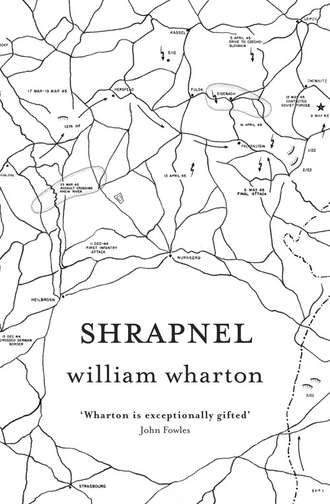
Полная версия
Shrapnel
I put my rifle in the rack. I’m covered with mud, a combination of dust and sweat.
‘So, what happened.’
‘I did it. I’m out. I’ve got a medical discharge, honourable. In three days I’ll be home. I’ll just have enough time to enrol in school on a late registration. I’ve got “enuresis”. The US Army can’t use me. Isn’t that too bad?’
He smiles and jumps up to where he keeps his clock. ‘Here, take this. It’s a gift for keeping quiet and not giving me away. I’m sorry to have wakened you, and for the stink, but I don’t want to be dead. Bodies smell worse.’
So, he gets out of the army. In a few days we have a replacement from another company named Gettinger. Gettinger goes down with us to Fort Jackson, South Carolina, and we go through a lot together. He’s killed outside Metz. One thing I learn is it pays to have a university education.
LOGAN
About two weeks after the alarm clock business, we’re hanging around the bulletin board outside the orderly room. I’m with a fellow named Logan. He’s from Steubenville, Ohio, and is the only one of us who receives money from home in addition to his monthly pay.
Logan receives one hundred and fifty dollars monthly. Logan has good reason to hate the army.
He’d been an air cadet. He’d become battalion commander of his cadet class. They were preparing for graduation, after which they would all become Second Lieutenants. Logan was drilling his battalion in close order drill, marching, high stepping smartly, backward down the company street when he was hit by a jeep from the rear. He spent three weeks in the hospital with broken ribs and a cracked collarbone. When he came out, he was classified as unfit to be an air cadet and was transferred to the infantry.
He still, illegally, has a complete Second Lieutenant’s uniform, tailor made, down to the gold bars. He’d had them ordered before he was clobbered. Officers, because they are officially gentlemen, need to buy their own uniforms. Even now, as an enlisted man, he still has his shirts and fatigues tailored. He has them dry cleaned and pressed, off post. Except for the missing bars he looks more like an officer than most of our real, so called, officers and gentlemen.
One day there’s an announcement on the bulletin board telling about two openings as ‘cook’s helpers’ and asking for volunteers. ‘Cook’s helper’ is the army’s way of saying KP pusher. We’ve just had a miserable day in the field making a march wearing gas masks, through waves of tear gas. Anything looks better.
Logan stuffs the notice in his tailored pocket. We go up the steps to the orderly room and officially volunteer our services to Reilly, the company clerk. He tells us we’re the first to volunteer; we know we’ll be the last. The next day, at roll call, we’re told to report to the orderly room.
Lieutenant Gross, the executive officer, tells us we are taken off the regular roster and temporarily reassigned to Sergeant Mooney, the cook, as helpers. We are to report right away to the kitchen and Sergeant Mooney. We salute our way out and start to worry. It all seems too easy – generally, volunteering in the army is a dumb idea.
But it turns out to be really great. Mooney is fat and sloppy. He likes to eat and likes to drink, but he doesn’t like to cook. Whenever I read the comic, Beetle Bailey, I think of Sergeant Mooney.
Our job is to wake the KPs at four am, get them down to the kitchen, assign duties, and have things ready for breakfast at seven. Theoretically, we aren’t supposed to do anything ourselves, just make sure the KPs get the work done. We stay on at night until the kitchen is clean and the dining hall ready for the next day’s breakfast.
The thing that makes it great is we’re on a day, and off a day, taking turns. If the company clerk and executive officer agree, we can even have passes to town on our days off. Also, even when we’re on duty, there’ll always be a few hours after lunch and before dinner when we can take turns going back to the barracks and resting. We’re living in luxury. That alarm clock Corbeil gave me in basic comes in handy.
Now, in general, KP pushers are loved just about as much in the army as trusties are in jail. They’re considered finks. They’ve sold their souls to the devil. Logan and I decide to change this around. One of the prime power plays of KP pushers is the assignment of jobs. Those go all the way from the easiest, that is serving and setting tables, to the worst, ‘pots and pans’. We immediately let it be known that it will be first-come, first-serve from now on. Whoever gets there first gets the first choice of jobs. I even rent out my alarm clock a few times when I’m not on duty.
Then we begin getting more and more done in the evening before we shut down the kitchen, so we can wake the KPs later in the morning. We have a good breakfast made for the KPs with eggs, scrambled or fried, four or five strips of bacon, orange juice, cereal, milk and coffee. Nobody else is eating like the KPs except us. It turns out that Logan, besides liking fine clothes, likes good food and can cook, a real Epicurean.
As long as things get done in the kitchen, the cook couldn’t care less. He never comes in till O six hundred anyway. We begin waking KPs at O five hundred instead of O four hundred. Because neither of us is a particularly aggressive or hostile type, we gradually bring the KPs onto our side, or, maybe, we go over to the side of the KPs, whichever way you want to look at it. We’re friends to everybody.
The cook is satisfied because we’re getting the work done, so he has hardly anything to do. We develop all kinds of short cuts, more efficient ways to do things, not a particularly difficult task.
Logan and I work out a system to keep the stove burning overnight by feeding it just before lights-out and wrapping the coal in wet newspapers. So now the KPs come into a nice warm kitchen, with the tables set and most of the work already done. We begin to think being cooks would be great. The cook even recommends that we be sent to cook’s school. Also, our company is the only one where everybody is begging to be on KP. Logan figures if we can gain control of the KP lists, we can even charge!
We gradually find out that the food being served is so terrible because of the way it’s cooked. Nobody in the country is eating the way we’re supposed to be being fed. It’s actually food fit for kings. These great big beautiful pork chops come in, at a time when meat rationing is tough for civilians, and this cook takes those hundreds of pork chops and dumps them in a big pot of boiling water. Then he pulls them out dripping wet and gives them a little frying on the griddle with greasy oil so they’ll look better, as if they’d been fried or roasted. But they taste like cardboard and are as tough as shoe leather. They only look like pork chops. We talk the cook into letting us do more and more of the cooking while he sinks slowly into his private stew, alcohol.
Logan is teaching me how to cook. We start making things like Beef Stroganoff instead of stew, chipped beef in garlic sauce instead of ‘shit on a shingle’. We even get so we can do a fair job of broiling steaks, giving a choice: rare, medium or well done. That’s quite a trick with two hundred people to be fed in less than an hour. The KPs get into the spirit. The Captain promotes the cook from staff to tech.
Around this time, some of us are given a chance to take our first furlough. I go home to California where my folks have moved from Philadelphia while I’ve been gone. Logan will take his furlough when I come back. He’ll double up and handle both ends of the job, do all the cooking. I have twelve days travel time. This plus the ten-day furlough comes to twenty-two days. With a little manoeuvring on the weekends at each end, I have twenty-four days altogether. I feel paroled. I’m going to be out of the army, on my own, after almost six months as a prisoner. It seems like a dream come true.
For the first time I visit my parents in California. I meet the woman who becomes my wife six years later. We dance a lot. There are great bands, big swing bands in Southern California then. We dance at the Casa Manana and the Casino Ballroom. Jimmy Dorsey, Harry James, all the big ones play. Most of the men dancing are in uniform. It’s a great furlough. When I come back, I find I’ve been put onto the duty roster again! I can’t believe it.
Logan is at cook’s school and the cook had been broken to private. There’s another cook who doesn’t want cook’s helpers, KP pushers. I’m back on the line in a line outfit. I feel I’ve been rooked. I have been!
Much later, I learn that in the battle of the Ardennes when everybody, truck drivers, clerks, cooks, even the regimental band are put up on the line, Logan shoots himself in the arm with a carbine. If you do a thing like that you’re supposed to hold your hand over the rifle and shoot through a cloth, between the bones. I thought he’d have done a better job of it. Or maybe it really was an accident.
SERGEANT HUNT
Before we’re shipped overseas, I’ve been reassigned to Regimental Intelligence and Reconnaissance, called I&R. Somebody scanned my records and found my AGCT score. I move from K Company to Regimental Headquarters company.
It’s even better than being a KP pusher. We’re given special training in patrolling, using high tech (for the army that is) phones and radios, we get to drive jeeps, trucks and weasels. Weasels are a kind of personnel carrier that has tracks and can go through water. We’re even sent back to Benning for parachute jump training. In two weeks we make five jumps. They won’t let us make the sixth because then we’d be eligible for paratrooper jumping wings, which would have given us fifteen dollars extra a month.
The Master Sergeant of Regimental Headquarters is a special kind of person. He could well be one of the meanest people I will ever know, but he is always smiling and laughing. He has small eyes and a big stomach. He’s ‘regular army’ and a southerner. I don’t know how smart he actually is, but when it comes to running an infantry company he’s a genius. He runs a company as if it’s his own private army, set up for his personal profit. We privates, and everyone else, are his serfs.
The Company Commander and other officers love him because they don’t have to do anything. The Company Commander is just decoration in this company. Twice Sergeant Hunt is offered a commission and refuses. He lives better, eats better, and makes more money with all his schemes, than the Regimental Commander.
But he makes one mistake. He gets too greedy; and somebody, somewhere along the line, discovers that Hunt’s been having marital allotment cheques sent to three different women in three different states. He’s a trigamist. He could get away with this because he signs the allotments himself. He has one wife in Alabama, one in South Carolina and another in Mississippi. There’s a court martial and he’s broken all the way down to Private. He has to make up for the fraudulent allotments and he does. I think he’s a rich man by that time, anyway.
Anyone else would have wound up in Leavenworth, but he can call in some of his chits, and officers like him. He’s moved into the regular barracks like the rest of us, and we have a new Master Sergeant shipped in.
Now everyone who’d ever been given a hard time by him jumps on Private Hunt. His life isn’t worth living. Shaving cream is squeezed into his toothpaste tube, he’s short-sheeted every night and has to remake his bed before he climbs into it. There can be anything, spiders, scorpions, snakes, condoms full of water, anything, under those blankets. But he never says anything, he just smiles, crinkling his eyes; throws these things on the floor, and puts everything back together.
He has all the shit details; latrine duty, KP, and pulls hard guard. Even lousy PFCs try to make his life miserable. He only smiles his fat smile with flesh bunched up around those small eyes. To me he looks more dangerous this way, his shirt sleeves showing where his old master stripes had been when he was top kick. I make a point of staying away from him.
He’s older than any of the company officers, including the new CO, by far. Probably in his late thirties, he seems like an old man to us. He just keeps his mouth shut, does whatever he’s told, no matter what, even things he doesn’t have to do, like mop the barracks floor every morning before reveille. And nobody knows arm regulations, word and verse, as Hunt does. I’m convinced something bad is coming.
It doesn’t take long. He somehow manages to be transferred to ‘C’ Company. Then, nobody ever went up through the ranks the way Hunt does. He stitches each new rank on with big loose stitches until he’s finally back to three up, three down, with the diamond of a Master Sergeant. These he stitches on tightly.
Starting right then, he begins arranging transfers from Headquarters to C Company of about twenty non-coms and PFCs. These twenty are those who had given him the worst time. We all go down to look at the bulletin board every morning with dread. We never hear from any of those soldiers again except to see their names on the demotions list, if they had any rank. He wears them down, one at a time. Since then, I’ve harboured a fear of big, smiling, fat, southerners. It’s a form of personal bigotry.
WATER
At Fort Jackson, the last part of our training is a series of thirty-mile ‘water hikes’. We hike thirty miles in one day, camp overnight, then come back thirty miles the next. We do this on one canteen of water, so we go sixty miles on a quart of water, which isn’t much, because it’s hot and humid.
Right away, a friend of mine, named Pete, decides he’s going into business. He solders, or tapes together, three number ten cans with the bottoms and tops cut off of them; I don’t know how he does it, but he does. He even builds in a small plug. I watch him do this after field duties, in the dark, and I begin to think he’s going crazy.
We normally carry a full field pack on those hikes, along with our M1s, ammo and bandoleers. The rest of the pack is our mess kit, blankets wrapped around a tent, a tent pole, tent pegs and underwear. We carry it vertically sticking up higher than our heads, and it weighs about sixty pounds with everything in it.
Now Pete has several gallons of water in his contraption, but no shelter half, no blankets, no tent pole, no tent pegs. I know a cubic foot of water weighs about seventy pounds, so it’s heavy. When we go out on the hike, he straps his water on his back. I admit, it looks like a regular field pack.
At the end of the hike, at the bivouac, everyone is dying of thirst. It’s very difficult not to drink water on the way, and there’s no water out there. The officers make the trip in jeeps, blowing dust in our faces as they go by with Jerry cans full of water. The idea is for us to fill up with as much water as we can before we start, then keep our water drinking down. But everyone is perspiring and urinating, so we’re lucky if we can save half a canteen for the night and the next day.
My mouth starts sticking to itself, my tongue to the top of my mouth, my teeth to my lips, my lips to each other. After a few hours our tongues are hanging out of our mouths.
Pete starts charging two dollars for a canteen cup half full of water. He must have twenty canteens full in that pack, which is a lot of money. But he winds up with no shelter half, no blankets, no tent pole, no tent pegs. He has no place to sleep.
Luckily for him, it’s a hot night and he camps out behind my tent. We pile a bunch of brush and pine needles around him so nobody will see him.
Now, the way you build a tent in the army is this. Each GI carries a half tent called a shelter half. Then two GIs get together, button the shelter halves together, and using two tent poles and all the tent pegs, have enough for a tent. Pete’s tent buddy, who isn’t in on the water ploy at all, has half a tent. All he can do is hide, along with Pete, trying to sleep under his shelter half. He definitely isn’t happy about this whole shenanigan.
But Pete pulls this nutty thing off. He divvies the water out until he has over forty dollars. He gives five of this to his deprived tent mate to shut him up. But he makes one mistake, he forgets to save any water for himself. However, this looks good in terms of his alibi if he needs one. He’s as thirsty, or thirstier, than any of us. He’s almost outfoxed himself. The good thing is that his full field pack is empty and doesn’t weigh more than ten pounds on the way back. But Pete’s problem is he likes to gamble. Within a week, he loses his thirty-five dollars, plus a bit more.
Of course, something like this can’t be kept quiet; the whole squad thinks it’s so incredible. The platoon leader finds out and calls Pete in. He asks if he’s really done it. Pete denies everything and insists somebody made it up. He shows he has no money, and by this time, he’s gotten rid of the cans. There’s no evidence whatsoever.
I’m sure the officers think it’s a pretty good scam, too, because no one ever does persecute or prosecute Pete, or even try to make his life miserable. But they check everybody’s full field pack after that. From then on, our ‘water marches’ are for real.
DOCTOR SMET
Well, finally we’re getting ready to ship out. We’ve been prepared for sixteen months now, to go to the South Pacific. We’ve been doing mock beach landings, jungle survival and those water marches. They issue special equipment and uniforms for fighting in the South Pacific. That’s a place we don’t want to go.
Then, at the last minute, we’re issued new equipment. Overcoats, galoshes, wool knit caps, olive drab long johns with trap doors. After a long train trip with the blinds down, we’re packed into the biggest damned boat I’ve ever seen in my life. Going up the gangplank it looks like a wall with round windows. It turns out it is the biggest ship in the world at that time – the Queen Elizabeth. We dash across the Atlantic at twenty-three knots per hour in five days, without escort. We’re supposed to be faster than submarines can shoot or something like that. But I doubt it, I rarely take my life jacket off. There are fifteen thousand of us packed into that ship, most of us are seasick after the first day. I spend as much time as possible floating in an old bathtub I find. The water sloshes over the sides with each lurch, but I stay more or less steady, waterlogged but not sick. Simple physics.
Eight of us pack a tiny third class cabin built for two. The mess lines are so long, one can just finish one meal in time to stand in line for the next, but most of us aren’t into eating much anyway.
We land in Scotland, and are then shunted from train to train. European trains, all darkened, shades drawn, with little cabins, chock full, smothering in full field packs and new uniforms. Finally, in the middle of the night, we arrive at what had been an old textile mill in the town. We’re supposed to be hidden here, for who knows how long. But this is impossible. You can’t really hide a whole division and there’s division after division hidden all over England waiting for the big moment.
We’re virtual prisoners in that smelly mill. Then somebody finds out that a black transportation unit had stayed in this mill just before us. So, without asking anybody, the goofy southern crackers throw all the mattresses out the window, into the courtyard, and burn them. After that, we sleep on the woven canvas straps of the bunks. Max Corbeil would have felt right at home.
One day I’m picked for a detail moving officers’ footlockers out of some trucks. I don’t know what these officers store in these footlockers, but they’re heavy enough for dead bodies. There are too many officers and not enough enlisted men in a Regimental Headquarters Company.
Pushing a heavy one up onto a truck, I really hurt myself. I’m sure I have a hernia, I hope I have a hernia. I’m transported to a hospital in a civilian ambulance. It turns out what I’ve done is develop a varicocele. I don’t know what it is, but hope it’s serious. It turns out to be a varicose vein in one of my testicles. It’s tender and I can feel it, like little worms, but it’s not what the doctors call ‘disabling’. We’re within weeks of the big move, nobody knows anything for sure, and if they do, they’re not telling.
I spend as much time as possible complaining, writhing, moaning, groaning. They give me a little canvas bag to wear on my balls. It’s like a cross between a G-string and a jock strap. They even give me an extra for when one gets too smelly. Two days later a doctor stands at the foot of my bed. He smiles.
‘I guess we ought to operate on this, but it’s not going to kill you and you won’t need to do any heavy lifting.’
I can tell he’s never carried a full field pack or an officer’s footlocker.
‘You just stay in bed here and I’ll have you back to your outfit in no time. Don’t you worry about it.’
He says this as if ‘getting back to my outfit’ is my fondest dream, like going home.
After he leaves, I’m really in pain; mental anguish. This could have been the chance of a lifetime for me to stay in England, practically like a civilian for the whole damned war.
My prime qualification is as rifleman. That’s the worst MOS you can have. The second worst is scout, that’s my second MOS, but my third is typist. I’d learned to type in high school and had gotten a good score on the army typing test. It’s my ace in the hole, a deep hole, unfortunately probably a foxhole. I know that if the outfit leaves without me, they’d need me in England. I’ll volunteer to type out forms, or maybe some Major’s personal war novel. Anything. My fingers itch to type.
The next time Doctor Smet comes around I’m curled up in agony out of habit more than anything; but he’s written off that varicocele. Yes sir, he’s going to do me a big favour and get me back to my outfit. He’s my friend. He’s going to save me from that nasty operation. I think he expects me to kiss his hand.
But now, of all things, he becomes interested in my right foot. I’ve always had a bump sticking out on the back of my right heel, since I was a kid. Whenever I buy new shoes I develop a blister there. It’s one of those things you learn to live with. He probes it with a finger, then a needle. He tries jiggling it back and forth. He keeps asking me if it hurts and I yowl. Tears come to my eyes. He writes on his little clipboard.
He brings another doctor over to look at it. I scream some more, pretending to be brave. He tells me I have what’s called a calcaneus spur. He asks me if it hurts when I walk.
’Well, yes Sir, it does. It gets all red and swells up on marches and I have blisters it’s so sore.’
He writes some more on his clipboard. Maybe I have a second shot at England.
I’m in the hospital four more days. Every time I have a chance, and nobody’s looking, I bang that calcaneus spur on the metal siding of the bed. I start limping when I go to the bathroom. It begins to hurt so much I need to limp. I stay awake and moan at night a lot. The nurses give me aspirins to shut me up.
The next day, Doctor Smet comes around with another doctor. This one seems to be a specialist. He turns me on my stomach, bends my knee up, twists my ankle in all directions and starts hitting the back of my foot with a little rubber hammer.
Of course, I’m screaming, howling, the whole time. I don’t need to fake it much because with all my thumping on the bed, that foot’s practically a piece of hamburger meat. The two doctors step back from the bed, ‘consultation time’ I figure. Maybe they’ll decide to discharge me, give me a medical discharge. I’ll have a disability pension. The second doctor comes up to the side of the bed. He has his clipboard at his side.
‘You’re in Headquarters Company, Regimental Headquarters, isn’t that right Soldier?’
‘Yes sir, I&R.’
‘Well, you won’t need to march much then. Just take care of that foot.’ He writes on the clipboard. He looks down at me and winks. Doctors, especially military doctors, should never wink.







